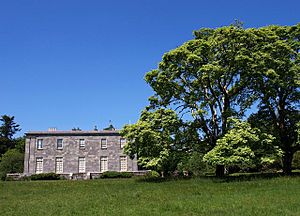Sophia Chichester facts for kids
Sophia Chichester (born Sophia Ford, 1795–1847) was a special person who supported new and different ideas about religion and politics. She helped important reformers like Robert Owen and Richard Carlile. Sophia was also the leader of a group called the British and Foreign Society for the Promotion of Humanity and Abstinence from Animal Food, which encouraged people to be kind to animals and avoid eating animal products. She and her sister, Georgina Welch, were seen as unusual because they were wealthy women who supported big changes in society during the Victorian era in England.
Early Life and Independence
Sophia Catherine Ford was born on August 7, 1795. She was one of eight children born to Sir Francis Ford and Mary Anson.
Sophia married Colonel John Palmer Chichester. He owned a large estate called Arlington Court in north Devon, England. Colonel Chichester passed away the next year, in 1823. This left Sophia with a lot of money and the freedom to make her own choices. She then moved to Ebworth Park to live with her sister, Georgina Welch. Georgina's husband owned this estate. Because they had money, Sophia and Georgina could do much more than many other women at that time.
Supporting New Ideas
Georgina was separated from her husband. Both sisters were unhappy with the marriage laws of their time. This feeling pushed them to support new and different ways of thinking. They started to connect with people who had unusual ideas. These included special thinkers, preachers, and political activists. The sisters would send them money by letter, keeping their support private.
A mystic and reformer named James Pierrepont Greaves became a close friend to Sophia and Georgina. He even stayed as a guest at Ebworth Park. Sophia gave Greaves £100 every year. She also supported Alcott House, a special community he started in 1838. Sophia continued to be a major helper for this community until she died in 1847.
Starting in 1837, Sophia began writing letters to Richard Carlile. He was a publisher who supported radical ideas. Sophia offered him friendship and money. The sisters often wrote letters together, making it hard to tell their individual thoughts apart. They wrote about how unfair and wrong they thought the marriage laws were. In 1838, they said that anything that could change the current marriage system would be good. They believed the system was very harmful.
Sophia and Georgina also wrote to George Jacob Holyoake, who believed in secularism (ideas not based on religion). They also corresponded with Robert Owen, another famous reformer. Even though Sophia supported these big changes, people described her as a polite and gentle woman. The sisters usually supported reforms from a distance. They helped each other emotionally and used their money and letters to try and change the world.
In 1841, Sophia Chichester translated a book called Le Phalanstère. This book was written by a Belgian writer named Zoé de Gamond, who followed the ideas of Fourierism. By translating this book without her name on it, Sophia could safely share her interest in new ideas from other countries. She also added many notes to the book. These notes allowed her to share her own thoughts and feelings publicly, even though her name was not on the translation.
Death
Sophia Chichester passed away on April 29, 1847. She died from tuberculosis.
 | Lonnie Johnson |
 | Granville Woods |
 | Lewis Howard Latimer |
 | James West |


